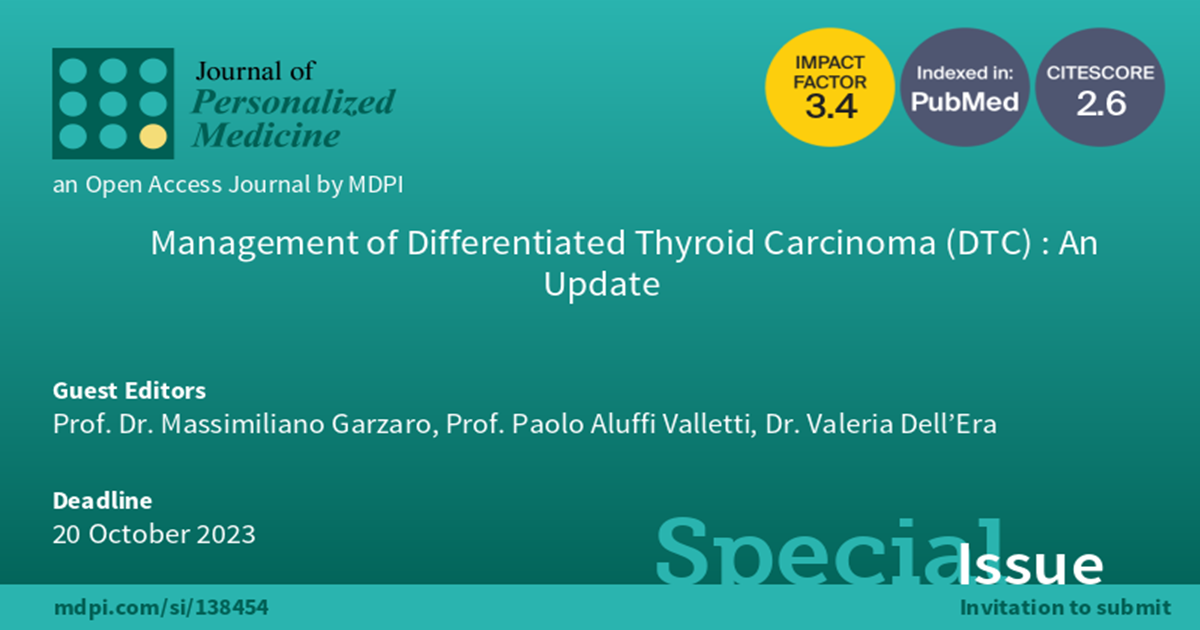Management of Differentiated Thyroid Carcinoma (DTC): An Update
A special issue of Journal of Personalized Medicine (ISSN 2075-4426). This special issue belongs to the section "Clinical Medicine, Cell, and Organism Physiology".
Deadline for manuscript submissions: closed (20 October 2023) | Viewed by 979

Special Issue Editors
Interests: rhinology; head and neck oncology; thyroid
Interests: otology; head and neck cancer; thyroid
Special Issue Information
Dear Colleagues,
Differentiated thyroid carcinomas (DTC) are the most prevalent endocrine malignant tumours; DTC incidence has increased worldwide over the last decades as a consequence of diagnostic accuracy, while DTC-related mortality has remained unchanged.
The management of DTC patients should be individualized according to the initial and ongoing risk stratification, and tailored according to individual needs and preferences.
Ultrasonography followed by FNA with cytological examination are the most important diagnostic tools (see TIRADS and Bethesda classification). However other patients’ related features (genetic syndrome, radiation exposure) contribute to defining the tumour behaviour. Altogether, the sonographic features of the thyroid nodule; Bethesda categories; molecular testing; and patient co-morbility (and preferences) should guide the clinician in choosing the treatment.
Recently, scientists have studied how machine learning (ML) models and big data analysis can summarise all these features stratifying the risk and support clinicians to refine diagnostic tools and improve their accuracy, resulting in a more tailored treatment (not necessarily surgical) and the performance of precision medicine.
Surgical approaches include less extensive treatments in patients with low-risk DTC (lobectomy, or minimally invasive techniques such as thermal or radiofrequency ablation) in order to reduce complications. Considering active surveillance in patients who refuse surgery could be an option.
To improve cosmetic results and avoid worsening patients’ quality of life, many authors suggest a variety of surgical procedures, including endoscopic or robotic-assisted procedures (trans-axillary approach, trans-breast approach, trans-anterior chest wall approach, retroauricular approach or the trans-oral thyroidectomy).
Intermediate and high-risk DTCs require total thyroidectomy followed by radio-active iodine (RAI) administration. There is no consensus about node management (preventive neck dissection, recurrent neck dissection).
Some kinase inhibitors such as lenvatinib and sorafenib prolong progression-free survival in patients with advanced progressive DTC and RAI refractory.
In this Special Issue we are looking for original research papers and reviews focusing on the personalized management of DTC patients.
Prof. Dr. Massimiliano Garzaro
Prof. Paolo Aluffi Valletti
Dr. Valeria Dell’Era
Guest Editors
Manuscript Submission Information
Manuscripts should be submitted online at www.mdpi.com by registering and logging in to this website. Once you are registered, click here to go to the submission form. Manuscripts can be submitted until the deadline. All submissions that pass pre-check are peer-reviewed. Accepted papers will be published continuously in the journal (as soon as accepted) and will be listed together on the special issue website. Research articles, review articles as well as short communications are invited. For planned papers, a title and short abstract (about 100 words) can be sent to the Editorial Office for announcement on this website.
Submitted manuscripts should not have been published previously, nor be under consideration for publication elsewhere (except conference proceedings papers). All manuscripts are thoroughly refereed through a single-blind peer-review process. A guide for authors and other relevant information for submission of manuscripts is available on the Instructions for Authors page. Journal of Personalized Medicine is an international peer-reviewed open access monthly journal published by MDPI.
Please visit the Instructions for Authors page before submitting a manuscript. The Article Processing Charge (APC) for publication in this open access journal is 2600 CHF (Swiss Francs). Submitted papers should be well formatted and use good English. Authors may use MDPI's English editing service prior to publication or during author revisions.
Keywords
- differentiated thyroid cancer (DTC)
- quality of life
- voice disorders
- machine learning
- new therapy
- surgical approaches
- surgical complications
- radioactive iodine (RAI)
- advanced local/recurrency in DTC
- neck dissection
- nerve monitoring
Benefits of Publishing in a Special Issue
- Ease of navigation: Grouping papers by topic helps scholars navigate broad scope journals more efficiently.
- Greater discoverability: Special Issues support the reach and impact of scientific research. Articles in Special Issues are more discoverable and cited more frequently.
- Expansion of research network: Special Issues facilitate connections among authors, fostering scientific collaborations.
- External promotion: Articles in Special Issues are often promoted through the journal's social media, increasing their visibility.
- e-Book format: Special Issues with more than 10 articles can be published as dedicated e-books, ensuring wide and rapid dissemination.
Further information on MDPI's Special Issue policies can be found here.







